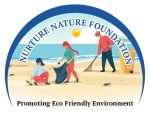Date: September 2-4, 2025
Venue: Ghana Shippers’ Authority Auditorium, Accra, Ghana
Organized by: Ministry of Fisheries and Aquaculture Development, Ministry of Transport, and Ghana Shippers’ Authority (GSA)
Executive Summary
The three-day stakeholder engagement on Ghana’s Blue Economy Strategy brought together government officials, private sector leaders, academia, civil society organizations (CSOs), and international development partners. The conference aimed to finalize Ghana’s first National Blue Economy Strategy, fostering sustainable use of marine and freshwater resources to drive economic growth, environmental stewardship, and inclusive development.
Nurture Nature Foundation (NNF) played a pivotal role as a civil society representative, ensuring grassroots voices were heard. Key themes included sustainable fisheries, eco-tourism, plastic pollution management, and the establishment of a Blue Economy Commission and National Blue Fund.
Conference Objectives
– Validate and finalize Ghana’s draft National Blue Economy Strategy.
– Build consensus on establishing a Blue Economy Commission.
– Define financing mechanisms, including the National Blue Fund.
– Promote collaboration among government, CSOs, the private sector, and communities.
– Position Ghana as a regional leader in sustainable ocean governance.
Participants
The engagement included representatives from:
– Government ministries (Fisheries, Transport, Environment, Lands, Tourism).
– Ghana Shippers’ Authority and National Development Planning Commission.
– Civil society organizations including Nurture Nature Foundation (NNF).
– Academia and research institutions.
– International partners such as AU-IBAR and IMO GreenVoyage2050.
– Private sector stakeholders in shipping, aquaculture, and eco-tourism.
Session Highlights
Day 1: Strategy Overview & Vision Building
The conference opened with keynote speeches from the Minister of Fisheries and Aquaculture Development and other dignitaries. The draft National Blue Economy Strategy was presented, emphasizing five pillars: Blue Wealth, Blue Health, Blue Knowledge, Blue Equity, and Blue Safety & Security.
Day 2: Stakeholder Consultations and NNF Contribution
Stakeholder groups discussed sector-specific challenges and opportunities. NNF highlighted the urgent need to tackle plastic pollution and integrate community-led initiatives like Adopt-a-Beach and Adopt-a-Market programs. NNF also advocated for environmental education, gender-sensitive policies, and the creation of green jobs through recycling and eco-tourism.
Day 3: Financing and Next Steps
Participants discussed financing strategies, leading to consensus on establishing a National Blue Fund. NNF proposed a dedicated community grant component to empower small-scale local initiatives. Closing remarks emphasized collaboration and innovation.
Key Outcomes
– Finalization of the National Blue Economy Strategy by the end of September 2025.
– Agreement to establish a Blue Economy Commission with civil society representation.
– Development of a comprehensive legal framework for governance and funding.
– Launch of a public awareness campaign on ocean literacy and sustainable livelihoods.
– NNF’s proposal for community-led monitoring and education incorporated into strategy drafts.
NNF’s Strategic Framework for Sustainable Oceans
NNF presented a five-point plan to ensure sustainability in Ghana’s Blue Economy Strategy:
1. Education First: Incorporate ocean literacy into school curricula and youth programs.
2. Community Empowerment: Support fishers, women traders, and youth entrepreneurs.
3. Waste Management Reform: Implement deposit-return schemes and establish recycling hubs.
4. Data-Driven Decisions: Community-led monitoring of marine biodiversity and pollution.
5. Policy Integration: Evaluate social and environmental impacts of all blue economy policies.
Regional and Global Context
The conference aligned with regional and international frameworks, including the AU Agenda 2063, ECOWAS maritime initiatives, and IMO’s GreenVoyage2050 program. Ghana’s strategy is positioned to foster regional cooperation and global leadership in sustainable ocean governance.
Recommendations
Government:
– Expedite the establishment of the Blue Economy Commission.
– Strengthen waste management laws.
Private Sector:
– Invest in eco-tourism, sustainable aquaculture, and recycling enterprises.
Academia:
– Expand research and training in marine sciences and waste management.
Civil Society and Communities:
– Lead advocacy and education campaigns at the grassroots level.
Development Partners:
– Provide technical and financial support for community-based initiatives.
Closing Remarks
The conference successfully united diverse stakeholders around a shared vision for Ghana’s blue economy. NNF’s contributions ensured that community voices and environmental priorities were embedded in the strategy. As Ghana moves toward implementation, continued collaboration will be vital to achieving a sustainable and inclusive future.

